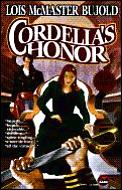
| Series: | Vorkosigan #1 |
| Publisher: | Baen |
| Copyright: | 1986 |
| Printing: | November 1996 |
| ISBN: | 0-671-87749-6 |
| Format: | Trade paperback |
| Pages: | 205 |
I read this book as the first half of the Cordelia's Honor omnibus, which is what the sidebar information is for.
I have finally pushed myself to get through this book, sine the rest of the Vorkosigan series has been so highly recommended to me by multiple people. I had tried once before, but never managed to get past the first twenty pages.
I almost didn't manage again. The first sixty pages of this book are just horrid. There are the characters who are supposed to be braving their way through challenges but instead just feel like they're all surfaces without deep emotions. There are the stupidly cliched politics (oh, look, it's an oppressive monarchy without regard for human life up against the peaceful yet plucky scientific culture). And there's the pathetic excuse for romance elements ("he's a horrible person from an evil culture... ooo, rippling muscles").
Thankfully, some of these elements do improve if you can manage to stomach the beginning. The politics, for instance, become somewhat less cliched and some of the earlier parts could be written off as character bias (although the plucky scientific culture is arbitrary, inconsistent, and never adequately explored). But most of these flaws persist.
My enjoyment of this book was hurt most by the characters, who are sad, hollow creatures with emotions skittering off their surfaces and never reaching any deep significance. There were times when the characters were supposedly happy, terrified, or despairing, but I only know because that's what I was told by the narrator. It's one of the worst cases of characterization by telling rather than showing that I've read in a long time, and as a result, I never emotionally connected with any of the characters. The romance never became credible, remaining a bad example of love at first sight without adequate explanation, and without real character depth there was little hope of salvaging it. It doesn't help that there are only about four characters in the book that Bujold even tries with — everyone else given barely enough attention to let them fulfill their place in the plot.
That being said, the plot manages to pick up after the middle of the book and the last fifty pages of this book, if you can make it that far, do manage to pull something out of the arbitrary hash of twists that led up to that point. Right about the point that Cordelia starts breaking with her history and going her own way, I found it easier to start paying attention. Bujold does pull quite a bit together at the end, putting some meaning behind the title and giving some sense of why the reader should care, although rather late in the game to really help. It's enough to keep this from being a really bad book, but not enough to raise it above the level of purely mediocure.
I have to compare this book with David Weber's On Basilisk Station, another bad book, because it suffers from some of the same problems. Cordelia shares some of the self-insertion fantasy characteristics, particularly her plucky ability to brush off bad things that happen to her and the tendency for all of her flaws to end up actually being merits that people just think are flaws. Bujold is a clearly better writer than Weber, putting more philosophical depth in the ending, but Weber manages to grab the emotions better between bits of idiocy (in part by being utterly ham-handed about character emotions rather than short-changing them like Bujold does). Both are bad first books of series, probably best avoided. (My friends did warn me.)
Definitely not recommended, but if you absolutely have to read it, the pain of the beginning does recede somewhat.
Followed by Barrayar.
Reviewed: 2004-04-04